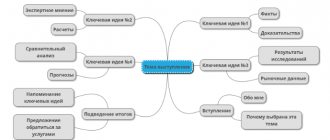The right start to a public speech is 50% of the success of the entire speech. Before you learn how to start speaking at a conference, prepare a greeting, an example plan, you need to consider the most important thing - time. A maximum of 6 seconds is allotted to make a first impression, and for the listener to form an attitude towards the speaker. The audience scans through nonverbal cues in your voice and body to see what and how you say. Experienced speakers devote 20% of their speaking time to the introductory part.
The beginning of the speech is like a movie trailer - short, catchy, a set of catchy points. The goal is to quickly captivate the audience. What's the point of speaking without the proper attention of the audience?
Content
- Greeting at a public speaking: how not to cause a yawn How best not to start a speech
- Make a link to the previous speaker
Event information
Whether it’s a corporate party, concert or other event, it is necessary to introduce guests to the celebration plan . This could be a review of competitions, an interesting performance, a presentation by a distinguished jury, or congratulations on an event. In addition, there is probably a plan for where to take guests at each time period. It is better to tell in detail about the movements so that there is no confusion. Even in a situation where it is a small seminar, a little time should be devoted to information.
The organizer must be able not only to plan a birthday or other holiday, but also to briefly present it. At the same time, you should keep some surprise, leave some zest.
Often part of the opening speech is printed directly on the invitation. The prose tells the main events and recommendations that allow you to spend the holiday with positive emotions. Even if this is a huge concert hall, it is necessary to follow some order , which is recommended to be announced so that all guests are familiar with it.
Greeting at a public speaking: how not to cause a yawn
Most people are constrained by fear, tension from the attention of a group of people, and a strong desire to run away arises. Even professional speakers experience difficulties - they worry about how to start a public speech and quickly get into a productive state. Vladimir Gerasichev - head of the Business Relations company, an expert in the field of business education - admits that he does not like the first minutes of the speech, he needs to warm up, get into the flow. By the way, a great technique: honestly admit to the public how you feel. But truly experienced speakers do it competently.
How best not to start a speech:
- “Hello everyone, let’s get straight to the point...” Don't skip the greeting in public speaking. Don't jump straight to the main part until you've made contact. The audience has questions: “Who are you?”, “What is the benefit of your speech?” It's like inviting a girl to your wedding night without a first date.
- “Sorry, I’m not an experienced speaker, don’t judge strictly...” People’s mental reaction: “Then why did you come out? Prepare yourself, don’t waste your time!” This is not a winning way to start a speech at an academic conference or when defending an important business project. Such phrases raise doubts about the speaker’s competence. The audience is waiting for a leader, play the role of a confident speaker to the fullest.
- “How can you hear me..?” Do you think this helps create a successful image? It looks like an inept attempt to pacify the excitement, to achieve any response from the audience. Do not do it this way. Everything you do either works for you or against you.
- Duplicate information from presentation slides. People either read or listen. Why do you need a speaker if you can read the text?
Features of any conference
A conference is an event whose purpose is to introduce valuable and interesting ideas to the scientific world. And the quality of the presentation of these ideas will determine how many people will hear and become interested in your topic.
It is at such events that sponsors often look for “victims” - applicants for research grants.
This is why serious preparation for the conference is so important. But to do this, you need to know in what order it takes place and what to expect from the event:
- Each participant in a scientific conference must register some time before its start. This is necessary so that the organizers can plan the presentations and group topics into areas, create a program for visitors, and then distribute to the participants the priority number for their presentations.
- Each conference has its own purpose and theme, which the organizer, philanthropist or sponsor talks about at the beginning. This is called the ceremonial part.
- Invitees are seated in pre-planned places - thematic sections. Speeches begin, which everyone listens to, and then they slowly delve into it and take part in the discussions.
- After all the performances there is a buffet - here those who are especially heated will be able to cool down their ardor, the speakers will be able to take a breath, and everyone who wants to will be able to make new acquaintances and chat with old acquaintances.
- Sometimes visitors from other countries and cities are provided with a sightseeing program or other entertainment activities.
- The final stage is the publication of a collection of scientific papers presented at the conference.
Tips for establishing contact with the audience
Make a link to the previous speaker
If the previous speaker spoke powerfully, cheerfully, and received a standing ovation, your excitement intensifies. I want to hold the bar, the tension inside is growing. What to do? Join a colleague's success:
- Stand in the same place.
- Start by continuing his last sentence.
- Agree with his key points.
- Smoothly transition into your topic as you move around the stage.
Did the previous speaker fail? Pretend that nothing happened, don’t “drown” your colleague even more.
Tap into the overall experience of listeners
“You and I all love sweets..”, “And remember how we were in childhood... Who had this? Raise a hand". In the first seconds, people make a decision - you are one of them or someone else. Do you vibrate at the same level or at different levels, whether your values suit them. Worst beginning: “You and I are on opposite sides of the barricades,” “It will be difficult for someone to understand.” Make a gesture by drawing a ball in the air - the sign of unification will enhance the effect of community.
Ask the audience to move closer
At live events, people usually sit wherever they want. By asking your audience to move seats, you will take them a little out of their comfort zone, and this will include even the most inactive. In this way you will influence the subconscious level of people, because they will do what you say. Show them the benefit - what will they get by reseeding closer - can they see and hear better? Or will you distribute manuals or demonstration material to the first rows? I hope you get the idea.
Start with a pause
Why is this necessary? Imagine: you are sitting in the hall. The stage is empty. Everyone is waiting for the speaker. There are about 300 people in the hall and there is a slight hum: someone is talking to a neighbor, someone is talking on the phone, someone is laughing out loud. How to start a public speaking at a conference or any other event in such a situation?
The speaker comes out and immediately begins his speech. Some listen, others continue the conversation without having time to come to their senses. What is the speaker broadcasting? “I can speak when they don’t listen to me”, “I don’t respect myself” - a complete waste.
Another variant. The speaker comes out, takes center stage on the stage, and pauses. He looks around the hall, smiles at someone, nods. The hall slowly falls silent. In complete silence, in a confident voice, the speaker begins: “Friends, good evening, everyone.” He testified: “Until they listen to me, I will not speak.” It looks strong.
Preparing a presentation for a conference
70% of people perceive visual information better. This is why presentation is so important. If you want to be listened to, follow the advice of experts:
- Slides should be concise and not overloaded with data. Take the example of Steve Jobs, who had 1 thought per slide. Use minimal words on one slide (let Twitter inspire you to do so). The information on the slide should summarize, not repeat, the speech.
- Use different ways to present information: lists, pictures, charts, tables, statistics and charts.
- Consider your use of colors. Choose 3-4 primary tones (neutrals) that go well together. If your color perception is not very good, use the help of special resources. Pastel shades (beige, light blue, light green, etc.) are chosen as the tone, and a contrasting color is used for the text on them. Remember: the eye perceives a light background with dark text better, and not vice versa.
- Photographs improve imagery and clarity. Try not to use boring images from a search engine. Take photos from free photo stocks (Pixabay, FreeStockImages, StockSnap).
PowerPoint is not the only presentation creation tool. There are others too. For example, Canva or Prezi offer tons of stylish and fresh templates prepared by professional designers.
“Connect” between the audience and the speaker
Greeting at a public speech is one of the key elements that begins to build a connection with the audience. How to create this connection? It is important that the audience takes your side. Start with what brings you and your listeners together. Have you been to this city or lived, do you have children, are you familiar with the problem of the people in the hall? Without this there is no point in performing further. When you win people over, they won’t be so critical of your possible mistakes.
By the way, this is important. Give yourself the right to make mistakes, you are a living person. Surprisingly, this mindset will give you a feeling of freedom and you will be less likely to make mistakes.
Preparing the text of the speech
The optimal speaking time is 10-15 minutes, of which 5 minutes are devoted to questions from the audience.
The speed of measured speaking is approximately 100 words per minute. It turns out that the entire speech should fit into 2 sheets of printed text in 12-point size.
“It takes more than 3 weeks to prepare a good impromptu speech,” said the famous writer Mark Twain
Here is the approximate content of any conference abstract:
- definition of a scientific problem, familiarization with the purpose and objectives of the research;
- stages and progress of the research (how the hypothesis was proven, whether the problem was solved);
- scientific novelty and value, personal contribution of the speaker and results.
Remember: the maximum concentration of listeners’ attention is at the very beginning of the report. Try to put the most meaning into this part.
Keep sentences short and simple, avoid introductory constructions. This complicates speech comprehension and wastes valuable time.
It’s best when the sentences are as short as possible and look like abstracts: this way the audience will remember more thoughts.
Don't forget to define complex terms.
An ideal speech is 1-2 minutes shorter than the time allotted to the speaker by the organizers.
When preparing, you need to take into account all possible risk factors: excitement, technical problems, etc. By making your report a little shorter, you will have peace of mind, because you will have precious minutes left over.
Don't forget to prepare handouts with important numbers, graphs, calculations, and examples. This will help save time and avoid “chewing” them during the performance.
Conclude by reminding the audience of your main problem. Mention your personal contribution to resolving the issue.
Tips for making your speech memorable
Psychologists advise using strong feelings and emotions in speech: information, along with strong emotional shocks, is best delayed.
Whatever the serious topic, add a part about personal experience to its discussion. The storytelling format is extremely popular today - telling stories based on real-life examples (it is often used at TED conferences). If you can’t give an example from your own life, describe in at least a couple of sentences how the research can be used in the lives of your listeners.
Algorithm for a confident start to public communication
- Exit . There is no need to start your speech on the fly. Slowly and confidently walk onto the stage, glancing lightly at the audience. Don't dig into the floor under your feet. No need to straighten your clothes or tuck in your shirt. You need to think about the marathon before going on stage. Otherwise, you will merge the speeches before the opening speech.
- Pause. Take a central position on stage and pause. Feel the direction of people's attention, the formation of impressions and attitudes towards you.
- Greeting and engaging question . Greet the audience in a cheerful voice and immediately ask an engaging question: “How are you feeling?” This powerful combination is not just for show. The question solves the following problems: setting the audience up for dialogue;
- “probing” for feedback. Pause after an engaging question and watch for a reaction. You will immediately understand what mood prevails in the room. If there is deathly silence after the question, don’t ignore it. Make a joke: “Yes, I see today my spirits are going through the roof”;
- relieving tension from gazes - you will feel relief on your skin, turning your attention from yourself with a question to the audience.
- Purpose of the speech . "Why are you here?" - the question that sounds in the listener’s head about the goal. But not yours as a speaker, but the audience’s goals. What did you come with? What results will the audience get from the presentation? Learn to shift your focus from yourself to your audience.
Voice the statistics
A bold statement containing statistical data is ideal for persuading the audience to listen to your recommendations and follow them in the future. The main thing is that these numbers are directly related to the main message of your speech.
For example, the vice president of sales for a leading US healthcare company successfully markets hospital software using this method. She begins with dry but impressive numbers: “Medical errors have become the third leading cause of death after heart disease and cancer. We are talking about 400 thousand cases a year. This is much more than previously thought. We want to create a world without medical errors, and we need your help."
Schools of public speaking
For those who cannot learn to speak in public and cope with their anxiety on their own, there are public speaking schools that train people who can speak beautifully and behave in a large audience.
At the public speaking school you can learn:
- Correctly warm up your vocal cords with special exercises to warm up your tongue and lips so that your diction is always clear.
- It is correct to place the voice apparatus with the development of a huge range, from very high to the lowest.
- Develop vocal power from the quietest to the “thunderous”. At the same time, diction must remain clear.
- Ability to place logical pauses with emphasis.
- Development of intonation expressiveness.
Upon completion of such a school, a certificate of completion is issued.
Words from the wedding host
Words from the host at the meeting of the newlyweds.
Today we celebrate an event of exceptional significance, the wedding of two wonderful people. Those closest and dearest to you have gathered to share the joy of this holiday, among whom are those to whom you owe your birth and your successes. Approach your parents and get their blessing.
Greeting the guests, words from the host.
Good evening, dear guests! Today is November 28th and we are with you at the most important event of this year, the wedding of Alexei and Tatyana! We celebrate the brightest and most wonderful holiday! A holiday of love and continuation of the human race! My name is Vadim and I am very glad to see you cheerful, cheerful, shining! I announce a festive start and to your loud applause we begin! The newlyweds kindly allowed me to make the first toast and I encourage you to raise your glasses.
First toast, words from the host.
Alexey and Tatyana! Congratulations on such an important step in your life! Love each other and respect your parents. Give your parents grandchildren as soon as possible! And never forget that warmth and comfort in the house depends on both. I propose to drink to the young people, let this day become for them a countdown to the most wonderful stage of their lives! And a loud “Bitter”!
Giving the floor for congratulations to the groom's parents.
I hasten to introduce you, dear guests, to the groom's parents ! For the first time they have to be at a wedding as the parents of the groom. They are very worried! Feel free to applaud.
Providing a word of congratulations to the bride's parents.
It is difficult to imagine feelings more sincere than those of parents at their daughter’s wedding. It is even more difficult to find words that could express these feelings. Allow me, dear guests, to introduce you to the bride's parents . Please love and respect!
A toast to parents, words from the host.
Some time ago, beloved and desired children were born in the Ivanov family and the Petrov family - today's bride and groom. And now it would be wrong not to raise a toast to the parents of the newlyweds, who gave us such wonderful people. words of gratitude to their parents .











